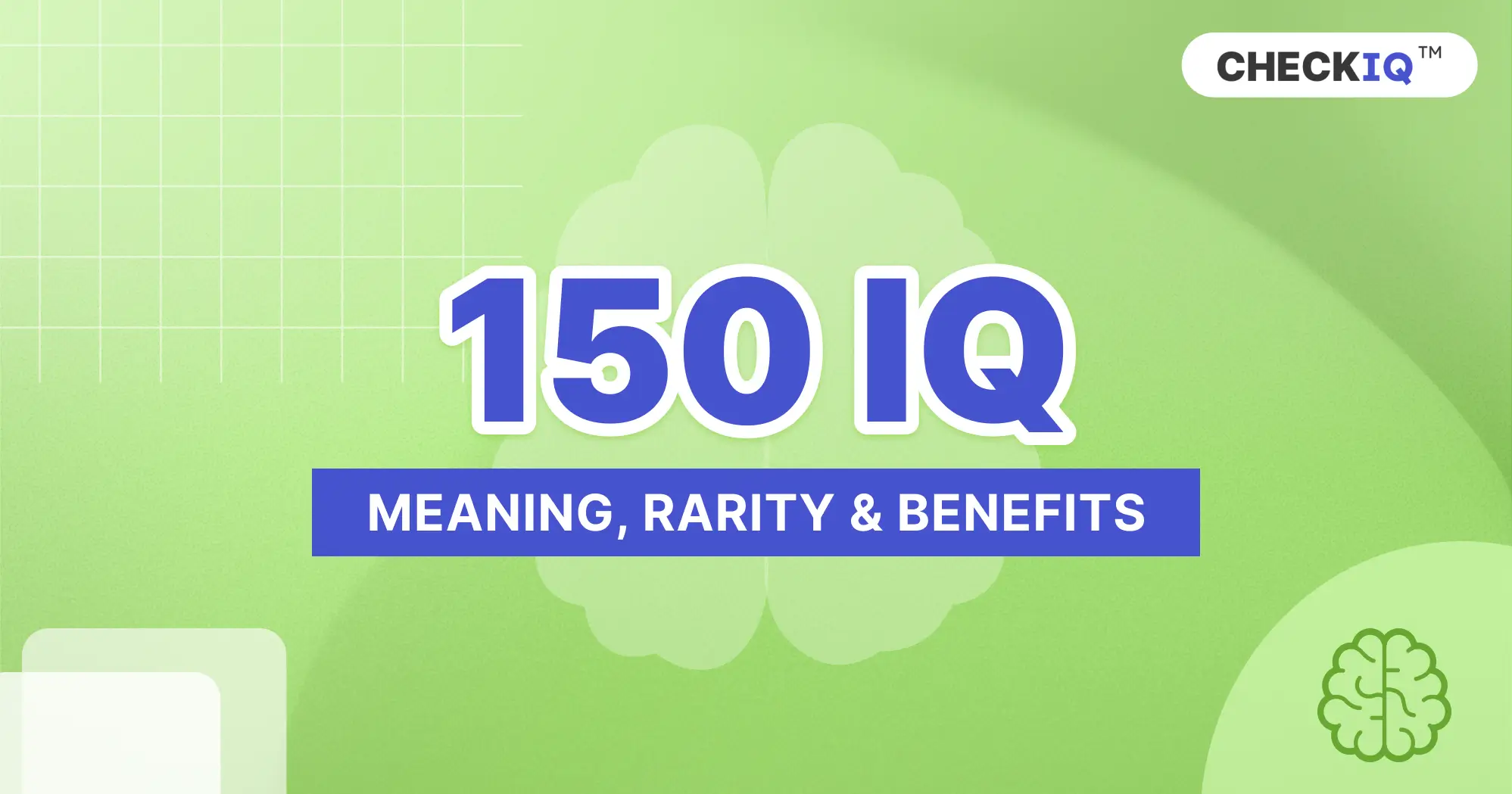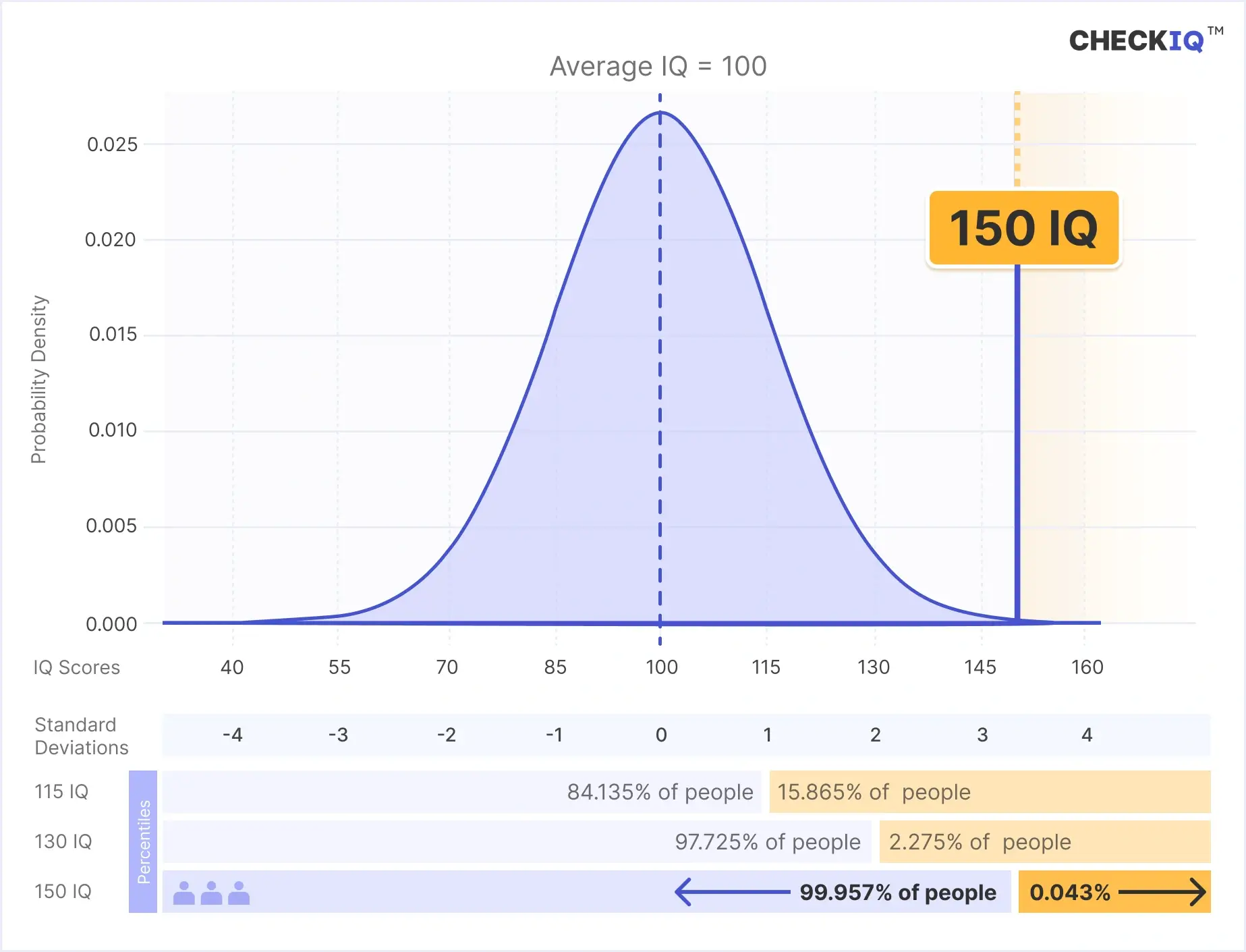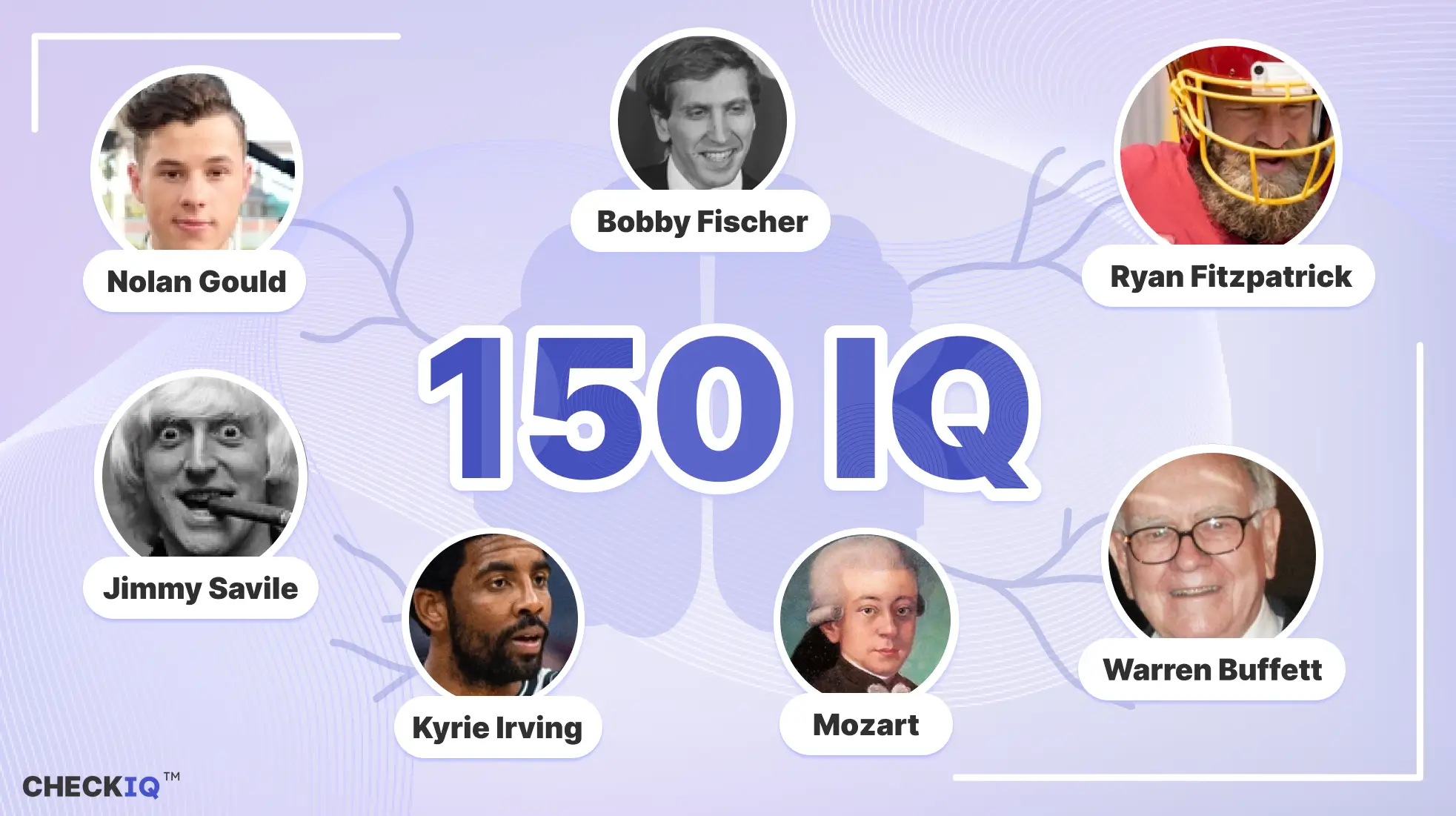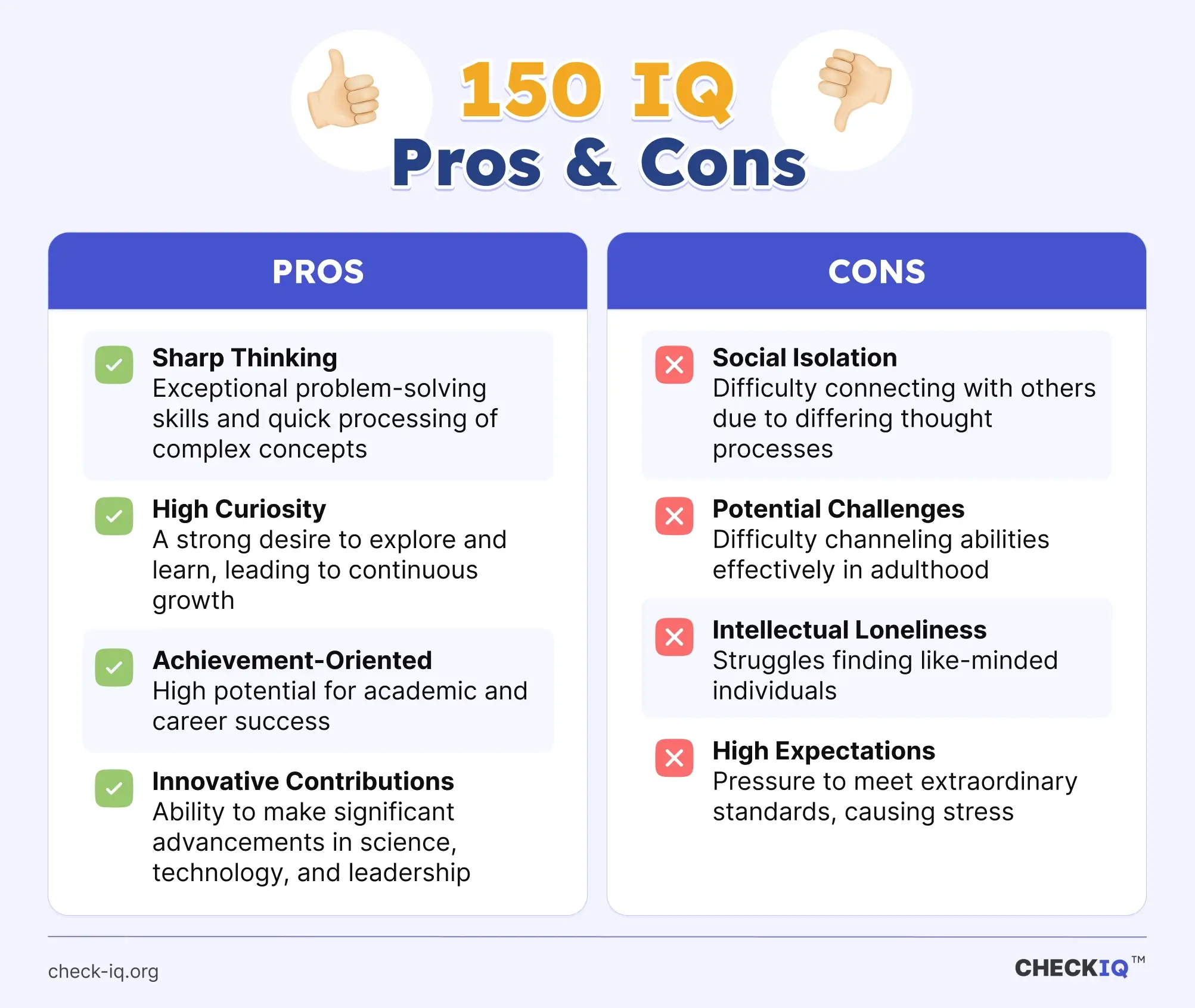What Does It Mean to Have an IQ of 150?

See what it's like to have an IQ of 150 / Image by CheckIQ
Imagine this: Warren Buffett, the oracle of finance who turns numbers into fortunes; Kyrie Irving, an NBA star who pairs sharp on-court skills with thoughtful, sometimes controversial, insights off the court; and Mozart, who, centuries ago, composed symphonies that still leave audiences in awe. How are they all related? All of them share one thing in common: an IQ of 150.
To say that a 150 IQ puts you in the top tier of the population is an understatement. In this article, we’ll explore what it truly means to have a 150 IQ and what living with such a unique level of intelligence feels like.
|
WHAT A 150 IQ MEANS IN KEY FIGURES |
|
|
IQ Level |
150 |
|
Percentile |
99.957th (a score higher than 99.957% of the population) |
|
Top % of Population |
Top 0.043% |
|
Rarity |
1 in 2,326 people |
1. What Does an IQ of 150 Mean?
What’s a 150 IQ score ?
An IQ score gauges how your cognitive abilities compare to the general population. A higher score suggests stronger skills in reasoning, problem-solving, and comprehending complex ideas. For example, with an IQ of 150, someone might quickly solve complicated puzzles or understand advanced mathematical theories that most people find challenging.
The most popular IQ test types, like the Wechsler Adult Intelligence Scale (WAIS) and the Stanford-Binet Intelligence Scales (5th Edition), use a 15-point standard deviation. This means that the difference between an IQ of 100 and 130 is two standard deviations (2 times 15). Thus, the more standard deviations an IQ score is above the average, the more exceptional it is. To put this into perspective, an IQ of 150 is over three standard deviations (3.33 times, to be precise) above the average IQ score of 100.
What percentile does an IQ of 150 fall into?
An IQ of 150 is exceptionally rare and places someone in the uppermost percentiles of intelligence. Let’s look at the numbers, keeping in mind that a percentile varies slightly depending on the standard deviation of the IQ test.
For tests with a 15-point standard deviation, like the Wechsler Adult Intelligence Scale (WAIS) or the most recent versions of the Stanford-Binet, an IQ of 150 falls at approximately the 99.96th percentile, according to our IQ to percentile calculator. This means only 1 out of 2,740 people score higher than 150. How exclusive is that!
For tests with a 16-point standard deviation, such as some older versions of the Stanford-Binet IQ tests, an IQ of 150 corresponds to about the 99.93rd percentile, meaning only 1 out of 1,430 people surpasses this level. Again, that’s truly remarkable!
To put this in perspective, an IQ of 150 is far rarer compared to an IQ of 115, which, while above average, falls at the 84th percentile, meaning 16% of people score higher. An IQ of 130, often considered "gifted," is in the 98th percentile, with only 2% of the population scoring higher. In contrast, an IQ of 150 places someone in the 99.96th percentile, meaning only about 1 in 2,326 people score higher.

How good is a 150 IQ?
A 150 IQ is, by definition, an exceptional score. To put it into perspective, let’s compare it to what’s usually considered a high IQ.
An IQ of 130 is classified as a “high IQ” and places someone in the “gifted” category. This level is achieved by the 98th percentile, with only 1 out of 44 people scoring higher. So, if you were to gather 50 people who have an IQ higher than the gifted level of 130, only one of them, would have an IQ of 150 (*). It’s the crème de la crème of smart people!
0.04% (150 IQ and higher) / 2% (130 IQ and higher) = 0.04 / 2 = 0.02 or 2% which represents the percentage of people with a 130+ IQ that have a 150 IQ. And 2% is equivalent to 1 out of 50 people (1/50 = 2/100).
2. Classification on the IQ Scale
Now that you understand how rare a 150 IQ is, let’s take a look at how different IQ scales classify it. As you may know, there are various scales used to measure IQ, each with slightly different interpretations.
150 IQ and Popular IQ scales
Most IQ scales’s highest range is 130, so a 150 IQ would be classified the same way as a 160 IQ.
|
IQ Scale |
IQ Range |
IQ Classification |
|
Current Wechsler Adult Intelligence Scale of Intelligence (WAIS–IV) |
130 and above |
Very superior |
|
Current Wechsler Preschool and Primary Scale of Intelligence (WPPSI–IV) |
130 and above |
Very superior |
|
Wechsler Intelligence Scale for Children – Fifth Edition (WISC–V) |
130 and above |
Extremely high |
|
Stanford-Binet Fifth Edition |
140 and above |
Very gifted or highly advanced |
|
Woodcock-Johnson R |
131 and above |
Very superior |
|
Kaufman Adolescent and Adult Intelligence Test (KAIT 1993) |
130 and above |
Upper extreme |
|
Kaufman Assessment Battery for Children (KABC-II 2004) |
131 to 160 |
Upper extreme |
|
Cognitive Assessment System 1997 |
130 and above |
Very superior |
|
Differential Ability Scales (DAS-II 2007 GCA) |
130 and above |
Very high |
|
Reynolds Intellectual Ability Scales (RIAS) |
130 and above |
Significantly above average |
Here’s a detailed comparison:
- Wechsler Adult Intelligence Scale (WAIS-IV), Wechsler Preschool and Primary Scale of Intelligence (WPPSI–IV), Woodcock-Johnson R, and Cognitive Assessment System (1997): A 150 IQ falls under the “Very superior” category.
- Wechsler Intelligence Scale for Children – Fifth Edition (WISC–V): A score of 150 is classified as “Extremely high.”
- Stanford-Binet Fifth Edition: An IQ of 150 is labeled as “Very gifted or highly advanced.”
- Kaufman Adolescent and Adult Intelligence Test (KAIT 1993) and Kaufman Assessment Battery for Children (KABC-II 2004): A 150 IQ is considered “Upper extreme.”
- Differential Ability Scales (DAS-II 2007 GCA): This test rates a 150 IQ as “Very high.”
- Reynolds Intellectual Ability Scales (RIAS): A 150 IQ is described as “Significantly above average.”
Each classification underscores the rarity and remarkable cognitive ability associated with an IQ of 150.
Sources for the IQ Scales
- Weiss et al. 2006, Table 5 Qualitative Descriptions of Composite Scores
- Kaufman, Alan S.; Engi Raiford, Susan; Coalson, Diane L. (2016). Intelligent Testing With the WISC-V. Hoboken, New Jersey: John Wiley & Sons. p. 237. ISBN 978-1-118-58923-6.
- Sattler 2008, inside back cover
- Kamphaus, Randy W. (2005). Clinical Assessment of Child and Adolescent Intelligence (Second ed.). New York: Springer. ISBN 978-0-387-26299-4.
- Urbina 2011, Table 2.1 Major Examples of Current Intelligence Tests
- Kaufman et al. 2005, Table 3.1 Descriptive Category System
- Gallagher & Sullivan 2011, Chapter 30: Kaufman Assessment Battery for Children, Second Edition. In Davis, Andrew (ed.). Handbook of Pediatric Neuropsychology. New York: Springer Publishing. pp. 343–352. ISBN 978-0-8261-0629-2.
- Naglieri 1999, Table 4.1 Descriptive Categories of PASS and Full Scale Standard Scores
- Dumont, Willis & Elliot 2009, Table Rapid Reference 5.1 DAS-II Classification Schema
- Reynolds & Kamphaus 2003, p. 30, Table 3.2 RIAS Scheme of Verbal Descriptors of Intelligence Test Performance
What is the equivalent of a 150 IQ for standardized tests?
An IQ score of 150 is exceptionally high, placing a person in the top 0.04% of the population. But what does this mean when it comes to standardized tests like the SAT, LSAT or ACT?
While it's tough to make a direct comparison, since IQ tests and standardized exams measure different things, a person with an IQ of 150 would likely score very high on these tests. They might achieve near-perfect or perfect scores because their strong reasoning and problem-solving skills help them excel.
However, it's crucial to remember that standardized test scores can be affected by factors like education, test preparation, and even how someone feels on test day.
An IQ score of 150 puts someone in the 99.957th percentile, meaning they have a higher IQ than about 99.957% of people. To put this into context, let’s see what this looks like on the most popular standardized tests.
|
Standardized Test |
Score equivalent to 150 IQ |
|
ACT |
36 |
|
GMAT (old) |
770 to 790 |
|
GMAT (focus edition) |
805 |
|
GRE (verbal reasoning) |
170 |
|
GRE (quantitative reasoning) |
170 |
|
GRE (analytical writing) |
6.0 |
|
LSAT (scaled score) |
178 |
|
MCAT |
523 to 526 |
|
SAT |
1570 to 1590 |
Here's how a 99.957th percentile level translates to standardized test scores:
- ACT: 36: you’d need to achieve a perfect score of 36 at the ACT to achieve that percentile, according to our ACT to IQ calculator.
- GMAT: 770 to 790: according to our GMAT to IQ calculator, on a percentile basis only, a GMAT score superior to 770 should land you in the 99.9th+ percentile using the old GMAT scoring system. Using the new GMAT scoring system, you’ll need to score a 805 (perfect GMAT score) to be in that percentile group.
- GRE: For both verbal and quantitative GRE, achieving a perfect 170 score places you at the pinnacle of test-takers, akin to scoring 150 on an IQ test according to our GRE to IQ conversion tool. Achieving a perfect 6.0 in the Analytical Writing section would also place you in the top tier.
- LSAT (Scaled Score): a 178 score on the LSAT positions you near the very top of all test-takers, paralleling the exclusivity of an IQ test score of 150.
- MCAT: You’ll need a minimum of 523 at the MCAT to be in the kind of sky-high percentile as someone with a 150 IQ.
- SAT: 1570 to 1590: scoring between 1570 and 1590 out of 1600 on the SAT puts you in the 99+ percentile according to our SAT score to IQ calculator, which is what you could consider equivalent to a 150 IQ. Scoring 1600 (perfect score) places you in a slightly higher percentile, around the 99.9th percentile or higher.
3. Rarity of 150 IQ
If you have a 150 IQ, you already belong to a rare and elite group of people with some of the highest IQ scores on the planet.
How rare is an IQ of 150?
An IQ of 150 isn't just high; it's extraordinarily rare.
To grasp how uncommon it is, imagine a crowd of over 2,326 people. Only one person in that crowd would likely have an IQ this elevated. This places someone with a 150 IQ far above the average.
Which high IQ societies can you get into with a 150 IQ?
If you have an IQ of 150 on the standard deviation of 15 scale, you qualify for some of the world’s most prestigious high IQ societies. With this score, you meet the entry requirements for societies that demand the highest cognitive abilities.
First on the list is the Triple Nine Society, which requires a minimum IQ of 146. With a 150 IQ, you surpass their threshold comfortably, making you eligible for membership. Similarly, the International Society for Philosophical Enquiry Society (ISPE) also sets their minimum at 146, so you meet their criteria as well.
While your score does not reach the exceptional minimums for the Mega Society (172 IQ) or the Giga Society (190 IQ), you are well-qualified for several other distinguished organizations. These include the Cerebrals Society, which requires a minimum IQ of 141, and Intertel, with an entry requirement of 135.
Your 150 IQ also places you above the 130 IQ threshold needed for Mensa International, the most well-known and widely recognized high IQ society in the world. Lastly, you qualify for the International High IQ Society, which has a minimum requirement of 124 IQ.
Try our accurate online IQ Test. Get your IQ score immediately.
Start IQ Test
4. Which Celebrities Have an IQ of 150?
While IQ scores of celebrities are often subject to speculation and not always publicly confirmed, here are some notable individuals who are reported or believed to have high IQs around 150:

Nolan Gould | View Nolan Gould’s IQ profile
- Profession: Actor known for his role as Luke Dunphy on the TV show Modern Family.
- Notable Facts:
- Member of Mensa, the high IQ society.
- Graduated high school at the age of 13.
Bobby Fischer | View Bobby Fisher’s IQ profile
- Profession: Chess Grandmaster
- Notable Facts:
- One of the greatest chess players in history
- Fischer had an IQ that was reported to be between 180-190
Ryan Fitzpatrick | View Ryan Fitzpatrick’s IQ profile
- Profession: Professional NFL quarterback who has played for multiple teams.
- Education: Attended Harvard University, earning a degree in economics.
Warren Buffett | View Warren Buffet’s IQ profile
- Profession: Renowned investor and CEO of Berkshire Hathaway.
- Notable Facts:
- Known as the "Oracle of Omaha."
- One of the most successful investors in the world.
Mozart | View Warren Buffet’s IQ profile
- Profession: Prolific composer of the classical era.
- Notable Facts:
- Composed over 600 works.
- Displayed extraordinary musical talent from a very young age.
- View Mozart’s IQ profile
Kyrie Irving
- Profession: Professional basketball player in the NBA.
- Notable Facts:
- Known for his exceptional skills on the court.
- Attended Duke University before joining the NBA.
- View Kyrie Irving’s IQ profile
Jimmy Savile
- Profession: Former British television and radio personality.
- Notable Facts:
- His reputation was severely tarnished after numerous posthumous allegations of misconduct.
- Involvement in various charitable activities during his lifetime.
- View Jimmy Savile’s IQ profile
Understanding Celebrity IQ claims
When it comes to celebrities and their reported IQ scores, it's important to approach such claims with caution. Many figures circulated about famous individuals' intelligence quotients are often based on speculation, anecdotal accounts, or unverified sources.
Without official documentation or confirmation from credible assessments, these numbers may not accurately reflect reality. A single score does not capture the full scope of a person's talents, creativity, or intellectual strengths, nor does it account for the diverse ways people excel in various fields.
Therefore, any assertions about a celebrity's IQ should only be trusted if they are well-documented and supported by reliable evidence.
Try our 100% adaptive online IQ Test. Get your IQ score within minutes.
Launch IQ Test
5. Pros and Cons of Having a 150 IQ
Imagine being one of the smartest people in the world, with an IQ of 150. It really seems incredible! However, there are both benefits and challenges that come with such high intelligence. Let's explore the pros and cons of having a high IQ, drawing on research, but also on real-life examples.
Pros of having a 150 IQ
Sharp Thinking
People with a 150 IQ are usually sharp thinkers. Their cognitive speed and ability to process information make them naturally suited for careers that demand high intellectual engagement. Fields like theoretical physics, advanced mathematics, or strategic leadership roles are often a good match. Research supports that individuals with such high IQs are capable of producing innovative and significant contributions in their chosen fields according to research.
High Level of Curiosity
One notable benefit is a deep sense of curiosity. This is a common sign of high IQ. Those with an IQ of 150 may possess a relentless drive to explore, question, and know the world around them, leading to continuous learning. Their problem-solving skills extend beyond academic or professional life into everyday situations, often finding efficient solutions where others may struggle.
Predisposed for Achievement
The pressure to live up to high expectations is a common experience for those with very high IQs. According to studies cited in Gifted Child Quarterly, being labeled “gifted” from a young age can pressurize a sense of responsibility to achieve extraordinary things. Adults who were identified as gifted in childhood often report mixed feelings about this label. On one hand, it can be a source of pride, but on the other hand, it can also bring distress and fear of failure.
Career and Intellectual Engagement
People with an IQ of 150 are well-suited for careers that require deep intellectual engagement, such as theoretical physics, advanced mathematics, engineering, and other research-intensive fields. Their ability to think critically and innovatively often allows them to contribute significantly to scientific advancements, technological innovations, and sophisticated decision-making processes in leadership roles.

Cons of having a 150 IQ
While the cognitive benefits of a high IQ are clear, the social and emotional aspects can be more nuanced. Research has shown that highly intelligent individuals sometimes feel isolated or misunderstood. The gap between their way of thinking and that of the average person can make connecting with peers difficult. This can result in feelings of loneliness, particularly during childhood and adolescence.
Gifted adults, defined as those who maintain exceptional abilities into adulthood, often experience what some researchers call “intellectual loneliness”, a sense of being out of sync with others’ perspectives and interests. Gifted individuals may find it challenging to relate to peers who do not share their intellectual curiosity or depth of thinking. However, for those who find like-minded communities or engage in deep intellectual relationships, this challenge can be mitigated.
In addition, the transition from being a “gifted child” to a “gifted adult” is not always straightforward. Although studies show intelligence levels remain relatively stable over time (Deary et al., 2000), the ways in which gifted adults choose to apply their abilities can vary greatly. Some pursue traditional paths of success, while others may take unconventional routes or face challenges in channeling their potential effectively.
Can a 150 IQ lead to success in life?
An IQ of 150 can certainly open doors to high-level achievements and opportunities. Studies such as the longitudinal work of Lubinski and Benbow from Vanderbilt University (2006) on young people with strong math skills shows that having this level of cognitive ability can help predict success in higher education and careers, especially in fields like science, technology, engineering, and math (STEM).
However, as noted by researchers like Feldman (1984), once a certain cognitive threshold is reached (often cited around an IQ of 120), other factors such as perseverance, creativity, and social skills begin to play a larger role in determining success. Similarly, emotional intelligence (EQ) is believed to play a bigger role in success, compared to IQ.
While a 150 IQ provides an outstanding intellectual edge, it does not guarantee success. Life choices, external influences, and emotional resilience are equally important. In the end, success depends on how well an individual applies their abilities, handles challenges, and finds balance.
6. How to Measure Your IQ
Measuring your IQ typically involves taking a standardized test administered by a licensed professional. These tests, such as the Wechsler Adult Intelligence Scale (WAIS) or the Stanford-Binet Intelligence Scales, assess various cognitive abilities, including reasoning, problem-solving, and comprehension. The scores from these tests are compared to a normed scale with an average score of 100 and a standard deviation of 15.
An IQ test delivered by a professional can cost up to $1500. A cheaper approach is to do an online IQ test. The advantage of it is that it is a more affordable solution, although the reliability and validity usually doesn’t match those of professionally administered assessments. However, they can offer a quick, less expensive way to get an idea of where your cognitive abilities stand compared to the average. For a more accurate assessment, opting for an adaptive online IQ test can help, as these are designed to adjust the difficulty based on your responses.
How reliable are online IQ tests compared to professional assessments?
IQ tests are designed to measure a range of cognitive skills, including logical reasoning, mathematical ability, language comprehension, spatial visualization, and memory. Traditional IQ tests, such as the Wechsler Adult Intelligence Scale (WAIS) or the Stanford-Binet Intelligence Scales, are administered by professionals and are standardized through extensive research to ensure accuracy.
Online IQ tests aim to replicate the structure of traditional IQ tests such as the Wechsler Adult Intelligence Scale (WAIS) or the Stanford-Binet Intelligence Scales. You’ll see a series of questions or puzzles that evaluate different cognitive domains, such as quantitative reasoning, spatial reasoning, pattern recognition, memory and sometimes verbal reasoning – although the latter skill is often absent to avoid cultural bias.
While online IQ tests may not be as comprehensive as professionally administered ones, they can still provide a valuable and accessible way to get a quick estimate of your cognitive abilities and see how they compare to the general population.
Does your IQ score change over time?
While significant changes in an individual's IQ are uncommon, it can vary slightly due to factors like brain development, education, and life experiences. Generally, IQ stabilizes in adulthood, with only minor variations typically observed.
However, over generations, there have been noticeable trends in IQ scores. The Flynn Effect describes a significant rise in average IQ scores throughout the 20th century, likely due to better education, nutrition, and stimulating environments.
Furthermore, some recent studies have observed a decline in IQ scores in certain populations, possibly linked to changes in education, technology reliance, or environmental factors.
This suggests that while an individual's IQ remains relatively stable, societal factors can influence overall IQ trends over time.
